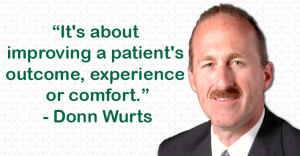Data scientists are in a great position as we stand on the doorstep of a new decade.
In a recent list of the Most Promising Jobs for 2019, LinkedIn – the social media site for business professionals – lists data science as No. 1. The site reported a 56% increase in the year-over-year job openings in the field, based on data from LinkedIn’s millions of member profiles, job openings and salaries.
Data science jobs include those found in health informatics and healthcare analytics.
All this supports projections from the federal government. The number of computer and information research scientists is expected to increase 21% by 2031, according to the U.S. Bureau of Labor Statistics (BLS). The BLS projects a 28% increase in the number of healthcare managers, which is the kind of job a master’s degree can help prepare you for.
Sought After Job Skills
Given the technical nature of so many of these jobs, most would expect the top skills needed by employers to completely focus on coding or data analysis. But that is not the case. The top skills employers are looking for include the kind of soft skills that you can combine with technical skills to make yourself a more attractive employee. This is especially true for leadership positions.
According to LinkedIn, the skills most in demand are:
- Creativity
- Persuasion
- Collaboration
- Adaptability
- Time Management
In terms of hard skills, employers want to see new recruits with skills in data science, data mining, data analysis and machine learning.
Overall, LinkedIn reports that the most in-demand skills across all jobs are in cloud computing, artificial intelligence, analytical reasoning, people management and user experience (UX) design. These skills work well with many of the most in-demand jobs from the LinkedIn list, including site reliability engineer, solutions architect, information technology lead and cloud architect.
Degrees and Certificates in Health Informatics
With the demand for data science and technology jobs high, more students – many of them working medical professionals – have decided to enter the health informatics field. That includes not only the management of electronic healthcare records, but also the ways technology is used to make hospitals, clinics and other healthcare facilities more efficient and effective.
The University of South Florida offers students both certificates and degrees in the areas of health informatics and healthcare analytics. They include:
Graduate Certificate in Health Informatics: This certificate is especially attractive to healthcare professionals who want to move into informatics. Coursework includes learning the foundations in management information systems; e-medicine business models and integrated electronic medical records.
Graduate Certificate in Healthcare Analytics: The SAS Approved graduate certificate in healthcare analytics will help you master the collection, organization and analysis of health data using the analytics life cycle. For those whose careers will involve strategic planning or quality improvement, this certificate may prove valuable.
Master of Science in Health Informatics: This is designed for those who wish to take on leadership positions in health informatics, such as health informatics director and potentially even C-suite positions. The program focuses on both technological and operational aspects of informatics with a focus on the integration and interoperability of technology.
MSHI Healthcare Analytics concentration: Students who choose the healthcare analytics concentration will acquire working knowledge of the tools necessary to shape the collection, management, analysis, reporting and sharing of healthcare data and information to support decision-making.
The LinkedIn list is yet another sign among many that data science and analytics are hot jobs that are unlikely to cool off anytime soon.
*National long-term projections may not reflect local and/or short-term economic or job conditions, and do not guarantee actual job growth. Information provided is not intended to represent a complete list of hiring companies or job titles, and program options do not guarantee career or salary outcomes. Students should conduct independent research for specific employment information.



